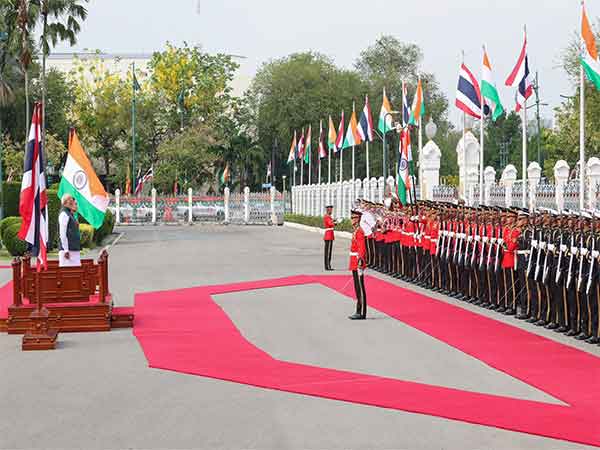
State should not interfere with religion: Sajad Gani Lone on Waqf Bill
Apr 02, 2025
Srinagar (Jammu and Kashmir) [India], April 2 : Jammu and Kashmir People's Conference President and MLA from Handwara, Sajad Gani Lone, stated on Wednesday that the state should not interfere with religion and that the Waqf (Amendment) Bill is a matter of religion.
"The Waqf property is collectively owned by the Muslims of the country. It is the right of the Muslims to decide on these (properties) by using their institutions and systems. The state should not have any interference with the religion. We do not advocate with any religion and neither with our religion. It is gross interference. It is our matter," Lone told ANI.
"It is a matter of our religion," he asserted, adding "We do not know what are they (Central government) are up to? Who are they looking to appease?"
Meanwhile, introducing the Waqf (Amendment) Bill, 2025, in Lok Sabha, Union Minister Kiren Rijiju on Wednesday questioned why Waqf properties haven't been used for the development of the nation and Muslims.
Rijiju said that India has the highest number of Waqf properties in the world and questioned why they haven't been used for the education, medical treatment, skill development, and income generation of poor Muslims.
"When our country has the largest Waqf property in the world, why hasn't it been used for the education, medical treatment, skill development, and income generation of poor Muslims? Why has no progress been made in this regard so far?" Rijiju said in Lok Sabha.
Rijiju also questioned the Oppositions objections to the PM Modi-led government working for the betterment of Muslims
"If this government, under the leadership of PM Modi, is working for the betterment of poor Muslims, then why is there an objection?" Rijiju asked.
Rijiju also noted that the number of Waqf properties has doubled in the country, and their income has also increased.
"Today, the total Waqf property has increased from 4.9 lakh to 8.72 lakh in our country. If these 8.72 lakh Waqf properties were managed properly, it would not only improve the lives of Muslims but also transform the destiny of the entire country." Rijiu said
"On our own WAMSI portal, we have reviewed the records. The Sachar Committee, which was formed in 2006 has also provided detailed information on this matter. In 2006, there were 4.9 lakh Waqf properties, and the total income from them was Rs 163 crore, and after making changes in 2013, the income has increased to Rs 166 crore," he added.
Rijiju clarified that under the new amendment Waqf board will have a broader representation and women will be compulsory member of the board.
"Now Shia, Sunni, Bohra, backward Muslims, women, and expert Non-Muslims will also be there in Waqf Board. Let me elaborate in detail. I'll give my own example. Suppose I am not a Muslim but I am Minority Affairs Minister. Then I become Chairman of the Central Waqf Council. Despite my position, there can be a maximum of' four non-muslim members in the Council, and among them, two women members are compulsory" Rijiju said.
He said that under this amendment Waqf board will have a centralised database, no secrecy, and improved efficiency.
"We have worked to improve efficiency by utilising technology. A centralised database and a digital portal will be implemented, ensuring that no one can secretly create Waqf properties under the cover of darkness. Proper registration, tracking, monitoring, and compliance mechanisms have been established. There is also a provision to rectify manual errors. The bill includes measures to address bureaucratic delays, and finally, proper auditing is essential. We are entrusting the responsibility of auditing to the state governments," Rijiju said.
Along with the Waqf (Amendment) Bill, 2025, Rijiju also moved the Mussalman Wakf (Repeal) Bill, 2024, for consideration and passing in the Lok Sabha.
The bill was earlier presented in the Lok Sabha on August of last year and a Joint Parliamentary Committee, headed by BJP member Jagdambika Pal, examined it.
The bill seeks to amend Act of 1995. The Bill seeks to improve the administration and management of waqf properties in India. It aims to overcome the shortcomings of the previous act and enhance the efficiency of Waqf boards, improving the registration process, and increasing the role of technology in managing waqf records.


























